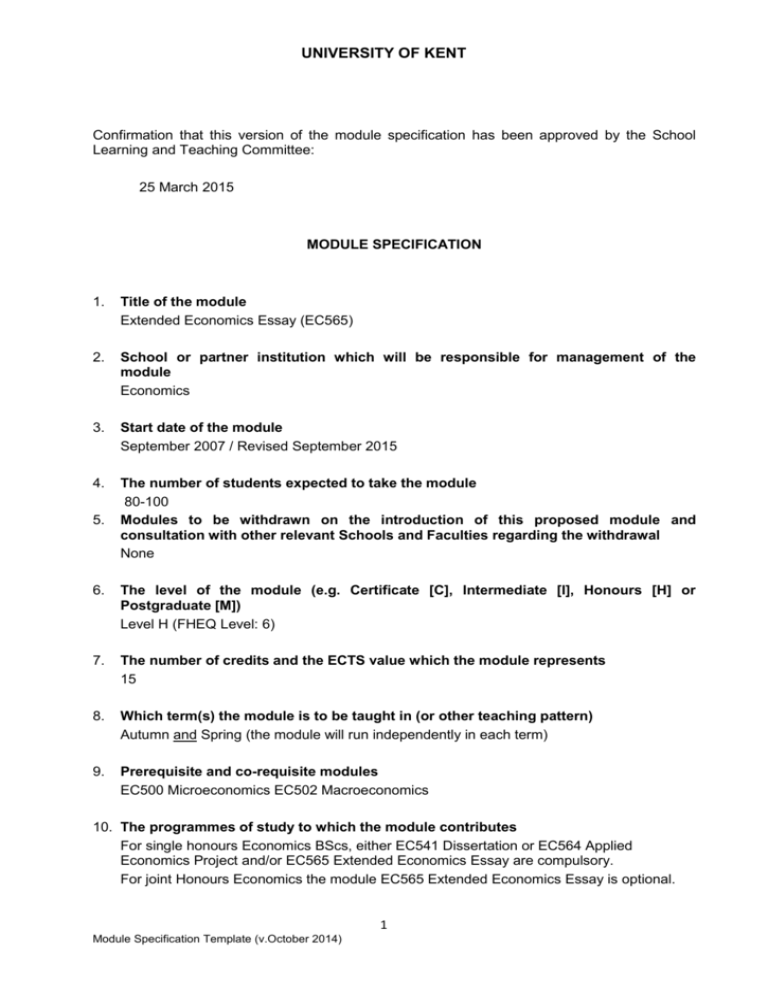University of Kent
advertisement

UNIVERSITY OF KENT Confirmation that this version of the module specification has been approved by the School Learning and Teaching Committee: 25 March 2015 MODULE SPECIFICATION 1. Title of the module Extended Economics Essay (EC565) 2. School or partner institution which will be responsible for management of the module Economics 3. Start date of the module September 2007 / Revised September 2015 4. The number of students expected to take the module 80-100 Modules to be withdrawn on the introduction of this proposed module and consultation with other relevant Schools and Faculties regarding the withdrawal None 5. 6. The level of the module (e.g. Certificate [C], Intermediate [I], Honours [H] or Postgraduate [M]) Level H (FHEQ Level: 6) 7. The number of credits and the ECTS value which the module represents 15 8. Which term(s) the module is to be taught in (or other teaching pattern) Autumn and Spring (the module will run independently in each term) 9. Prerequisite and co-requisite modules EC500 Microeconomics EC502 Macroeconomics 10. The programmes of study to which the module contributes For single honours Economics BScs, either EC541 Dissertation or EC564 Applied Economics Project and/or EC565 Extended Economics Essay are compulsory. For joint Honours Economics the module EC565 Extended Economics Essay is optional. 1 Module Specification Template (v.October 2014) UNIVERSITY OF KENT 11. The intended subject specific learning outcomes On successfully completing the module students will have: 11.1 Improved their ability to analyze economic problems 11.2 Deepened their knowledge of one particular area of economics 11.3 Carried out an in-depth critical investigation of a topic 11.4 Completed a written critical review of the literature of one area of economics 12. The intended generic learning outcomes On successfully completing the module students will have: 12.1 Improved their ability to retrieve information efficiently from library and web-based sources 12.2 Learned to manage their time well so as to complete the various stages of the critical review on time 12.3 Learned how to write a report of medium length 12.4 Improved their graphic, oral and written communication skills 13. A synopsis of the curriculum The module provides an alternative to students carrying out an economics research project in the dissertation module. Some students lack the necessary analytical, quantitative and research skills necessary for a piece of original research. This module will give such students the opportunity to investigate an area of economics in depth by critically reviewing the literature on a chosen subject. Students will be given a set of questions with readings. They can also construct their own question so long as it is approved. Each student would write a different essay. Examples of questions are: what evidence exists on the success(es) of micro lending schemes? Can active labour market policies reduce long term unemployment? Can economists explain voting behaviour? Students are taught about what is required for an extended critical review of the literature and advised about what should be contained in an essay on their topic. They are also advised about how to present a poster session. 14. Indicative Reading List B. Atkinson and S. Johns, Studying Economics, Palgrave, 2001 Other general books and advice on undergraduate extended essays are held by the library and Student learning Advisory Service. Additional readings will be given for the selected topics/questions. The information for individual topics will be accessed from the periodicals and books held in the economics section of the library and the Internet where appropriate. No additional books or journals will be required for the library. 2 Module Specification Template (v.October 2014) UNIVERSITY OF KENT 15. Learning and Teaching Methods, including the nature and number of contact hours and the total study hours which will be expected of students, and how these relate to achievement of the intended module learning outcomes There are six lectures which will take place in the first two weeks of term. The first four lectures cover research skills, what is required from an extended essay and what is a poster session. Two lectures/talks are dedicated to library and information skills. There are two 20 minute one to one sessions. The first gives direct advice on planning and writing of the chosen extended essay and the second later on in the term considers a first draft of the extended essay. In the last two weeks of term, the students produce a poster session and discuss their poster with two members of staff. These methods achieve all the learning outcomes listed in sections 11 and 12. The direct contact time and the work involved in writing the extended essay and producing the poster are expected to take 150 hours of student work time. 16. Assessment methods and how these relate to testing achievement of the intended module learning outcomes The final mark is assessed on the basis of a final report (80%) and a poster session (20%). The final report is a (up to) 5,000 word critical review of the economic literature on a chosen topic handed in the first week of the next term. The review is assessed on the range of literature considered, the reading, knowledge and understanding shown, the structure and presentation and the extent to which the review addresses the set question. In the last fortnight of the term, the students produce a poster on their review. This is assessed on content (10%), presentation (5%) and discussion with members of staff (5%). The students receive feedback on these three elements of assessment. The marking of the review and poster assess all the learning outcomes listed in sections 11 and 12. 17. Implications for learning resources, including staff, library, IT and space The Library will be required to purchase no new books or resources for this module. Existing paper and electronic resource are sufficient to provide for the chosen topic. IT is possible that some resources may have to be provided through Inter-Library loan (a limit of two per students) or students travelling at their own expense to other libraries. All staff in the School of Economics could teach the one to one sessions. Timetabling issues are not major and have been discussed with the Timetabling Office. 18. The School recognises and has embedded the expectations of current disability equality legislation, and supports students with a declared disability or special educational need in its teaching. Within this module we will make reasonable adjustments wherever necessary, including additional or substitute materials, teaching modes or assessment methods for students who have declared and discussed their learning support needs. Arrangements for students with declared disabilities will be made on an individual basis, in consultation with the University’s disability/dyslexia support service, and specialist support will be provided where needed. 19. Campus(es) or Centre(s) where module will be delivered: Canterbury 3 Module Specification Template (v.October 2014)







